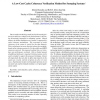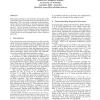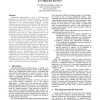142
click to vote
HPCA
2012
IEEE
13 years 9 months ago
2012
IEEE
Data races are a major contributor to parallel software unreliability. A type of race that is both common and typically harmful is the Asymmetric data race. It occurs when at leas...
143
click to vote
HPCA
2012
IEEE
13 years 9 months ago
2012
IEEE
Large-scale CMPs with hundreds of cores require a directory-based protocol to maintain cache coherence. However, previously proposed coherence directories are hard to scale beyond...
140
click to vote
CODES
2011
IEEE
14 years 1 months ago
2011
IEEE
Today, mobile smartphones are expected to be able to run the same complex, memory-intensive applications that were originally designed and coded for general-purpose processors. Ho...
143
click to vote
ISCA
2011
IEEE
14 years 5 months ago
2011
IEEE
As we move to large manycores, the hardware-based global checkpointing schemes that have been proposed for small shared-memory machines do not scale. Scalability barriers include ...
104
click to vote
USENIX
1994
15 years 3 months ago
1994
To function in mobile computing environments, distributed file systems must cope with networks that are slow, intermittent, or both. Intermittence vitiates the effectiveness of ca...
148
click to vote
DSD
2008
IEEE
15 years 3 months ago
2008
IEEE
Due to modern technology trends such as decreasing feature sizes and lower voltage levels, fault tolerance is becoming increasingly important in computing systems. Shared memory i...
134
click to vote
SC
1995
ACM
15 years 5 months ago
1995
ACM
The Convex SPP-1000 is the first commercial implementation of a new generation of scalable shared memory parallel computers with full cache coherence. It employs a hierarchical s...
134
click to vote
ACSC
2004
IEEE
15 years 5 months ago
2004
IEEE
This paper presents a case study for automatic verification using the Communicating Sequential Processes formalism. The case study concerns the Futurebus+ cache coherency standard...
162
click to vote
PODC
1994
ACM
15 years 6 months ago
1994
ACM
The notion of belief has been useful in reasoning about authentication protocols. In this paper, we show how the notion of belief can be applied to reasoning about cache coherence...
114
click to vote
CANPC
1999
Springer
15 years 6 months ago
1999
Springer
Streamlining communication is key to achieving good performance in shared-memory parallel programs. While full hardware support for cache coherence generally offers the best perfo...




